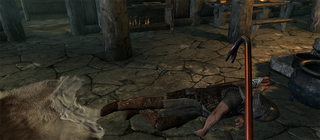
Valve has dropped the payment feature from the Skyrim Steam Workshop, not even a week after it was first implemented. Here, our writers share their thoughts on what went wrong, what could have gone right, and what may happen next.
Tom Senior: Imagine the furor that could've been averted* if Valve had announced the idea in a preparatory blog post which explained the arguments for a mod store and invited feedback. Instead they ambushed a community that's been consuming free mods for four years. Mods that were free one day suddenly weren't—would all mods soon be behind a paywall? Valve employees put the arguments for a mod store forward eventually, but most players don't care whether a modder ought to be able to buy a house for making something good, they just want the thing, and they expect it for free. It's not even selfishness, it's just an assumption based on the way mods have always been.
It sounds like Valve will try to relaunch the idea, but it'll have to be with a brand new game (Bethesda's next big open world, perhaps?) I think it will be very interesting to see if the system works the way Valve and their partners hope. I like the idea of a rich, competitive mod community that offers lots of stuff for free, with a bunch of premium killer mods heaped on top. I worry, though. If I had to pay a dollar for every mod I fancied trying, I would never have started modding my games in the first place.
*Actually people would have lost their shit anyway because The Internet.
Phil Savage: The reaction this time has been overwhelmingly negative—encompassing legitimate problems, philosophical opposition and naïve fear mongering—but its worth noting that this isn't the first time Valve has tried to make paid mods work. Their other attempts didn't result in as vehement a backlash. There wasn't a petition when Aperture Tag was released to the Steam storefront. Somewhere in the difference between these two approaches is a line that, according to the community, Valve shouldn't have crossed.
The problem, I think, is that this time Valve tried to hand the tools directly to modders. Aperture Tag was hand picked by Valve and given a space apart from Portal 2's Workshop. It was also new. For Skyrim, Valve and Bethesda gave everybody the opportunity to monetise their work, and that, of course, led to problems. Valve has a habit of doing this: dropping a new feature into the middle of their community and watching as it detonates. The problem is The Elder Scrolls' modding community is its own thing, and exists separately from the Steam ecosystem. More than that, PC gamers are incredibly protective of TES modders—and rightly so. When we put Skyrim into our Top 100, it wasn't the vanilla version. The game is great because its mod community is great, and has hammered the base game into something far and above the static console versions. You don't set fire to something that celebrated and expect to walk away unsinged.
I don't have a problem with modders making money from their work, but I also don't think there's an easy solution that will magically make it happen. Some say the existence of a donation option will instantly make everything better, but I think the reaction we've seen proves that many aren't willing to pay. I suspect the type of mod is important. Those included in the scheme's roll-out encompassed added systems, custom assets and improved visuals—all things the community is too used to getting for free. It's not right, but I do think Valve and Bethesda would have had an easier time if they'd restricted the scheme to new quests. If a total conversion like Enderal one day appears on the Steam store as a premium product, à la Aperture Tag, I don't think there'd be too much controversy. My assumption is that the community places more value on new content than on wide-ranging and necessary overhauls to existing systems. If I'm right, that sucks.
PC Gamer Newsletter
Sign up to get the best content of the week, and great gaming deals, as picked by the editors.
PC gamers love modding. The problem is there's less incentive than ever to part of a modding community. It used to be a route into the industry—a way for would-be developers to build a portfolio to show potential employers. Now we have Unity and an indie scene. Instead of making a mod, you could make a game. Instead of working for a big developer, you could work for yourself. I worry that this most recent backlash will cause modders to wonder how much they're actually worth to the gaming community at large. Luckily, there is hope. Former SimCity artist Bryan Shannon is currently making $820 per building to create new assets for Cities: Skylines. There are solutions that can work for all involved, and—If Valve is ever going to attempt paid-for mods again—it's in everyone's interest that they find one.

Tim Clark: I can’t say that I’m surprised that the reaction was largely negative, but the virulence of it caught me off guard. And it also seems to have come as a shock to Valve too, who let’s agree could’ve done a much better job setting out the case for a paid system, rather than sliding some Skyrim mods into view and saying: “have at ‘em”. What’s most frustrating is how binary the argument became as a result. Plenty of the concerns were legitimate, like those outlined by a modder this Steam discussion thread, but equally I felt persuaded by Garry Newman’s position. He wrote: “I sold a mod once and everyone was angry that it was happening, until it happened and they got a much better product than they’d have gotten when it was released for free, then they seemed to calm down a bit. It has given me a career for ten years. It’s bought me two houses, a bunch of cars. It’s created a company that has hired 30+ people.” Do we really write that experience off so lightly?
As Tyler noted last week, the ability to make a living from one’s work logically leads to being able to devote more time to the creation of that work. So, in theory, I still think a paid system that people felt was fair could have led to more and better mods, not less and worse. But given the explosiveness of the backlash, paid mods are effectively dead on the vine for now. Certainly I don’t see any big publishers being willing to risk being part of another PR shuttle crash. So, we won’t know how paid mods would’ve played out, but my two cents is that it would have neither been a dreamy new modtopia nor the coming of the modpocalypse. There’s a version of this in which the the best paid mods get iterated on and ultimately hit an unprecedented level of quality. But even in that scenario, there would still be a ton of stuff just done for the love of it or available for tiny fees. And, of course, plenty of garbage. Because if we can be sure of anything, it's that.
Tyler Wilde: Valve messed up. It launched this the wrong way. I understand the anger, and I had all kinds of concerns when the Skyrim Workshop suddenly changed last week. I chose optimistic speculation over fear of the absolute worst, though. I speculated that paid mods could lead to better mods, happier modders, and more games with mod support. Maybe I was being too optimistic, but who can say now?
I don’t expect Valve to try something quite like this again soon, but at least its own games and systems like Player Studio continue to test these waters. I like the idea that creative and skilled gamers might, if they choose, be able to earn a living making games better. I agree with many of the arguments against Steam’s implementation, but a lot of the philosophical arguments seem weak to me. ‘Modding is a hobby.’ Lots of people earn money from their hobbies. ‘Modders should do it for fun, not profit.’ Who are we to tell them what to do with their time and skills? ‘Modders should get jobs at studios if they want to make money.’ Easier said than done, and not for everyone. Ultimately, if a publisher makes it legal to sell derivative works, there is nothing immoral or unethical about selling them. I worry too about how it might change the historically collaborative modding community, but I also see lots of potential good.
Maybe Valve can’t be the one to make that happen on a large scale, and it has to remain a partnership directly between game makers and players—something built into the experience, as with TF2, and not added on. For now, I think that’s the direction we’ll see pursued. If Valve does try again, I’d recommend it starts with a fresh game designed specifically with asset and expansion mods in mind.
Hey folks, beloved mascot Coconut Monkey here representing the collective PC Gamer editorial team, who worked together to write this article! PC Gamer is the global authority on PC games—starting in 1993 with the magazine, and then in 2010 with this website you're currently reading. We have writers across the US, UK and Australia, who you can read about here.
Most Popular


